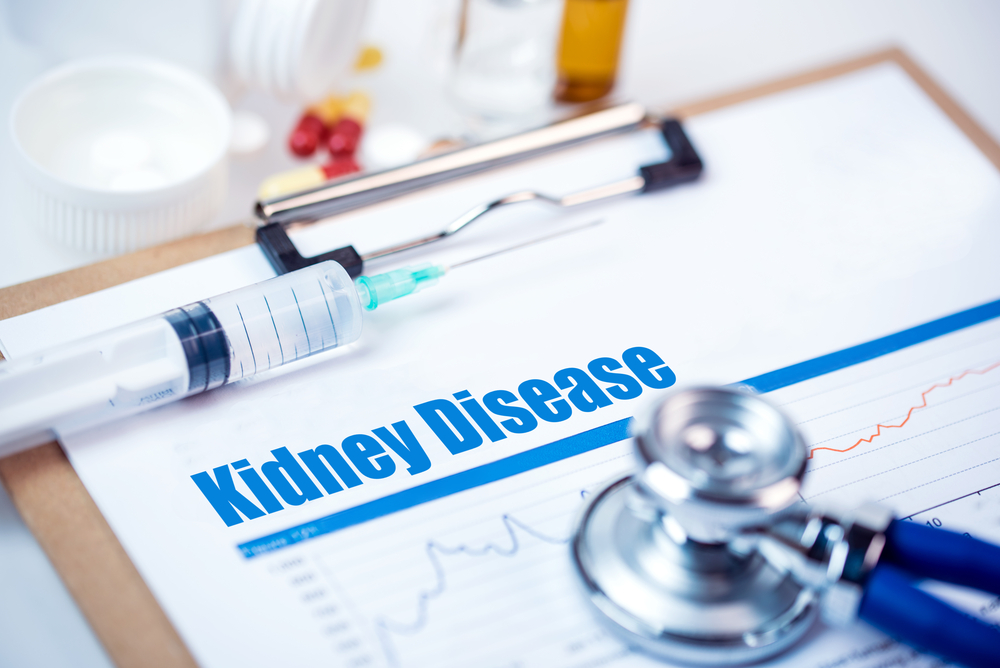 Chronic kidney disease is a serious condition in which longstanding disease of the kidneys lead to renal failure. Signs and symptoms of chronic kidney disease develop over time as loss of function can cause a buildup of fluid, bodily waste, or electrolytes. Depending on the severity, loss of kidney function can cause nausea, vomiting, fatigue, weakness, loss of appetite, frequent or infrequent urination, decreased mental sharpness, muscle cramps, swelling of the feet and ankles, dry, itchy skin, high blood pressure, shortness of breath, or chest pains. The loss of kidney function is gradual, which means that catching it early can be crucial to correcting the problem. While kidney damage is irreversible, preventing further damage is essential to maintaining functioning kidneys.
Chronic kidney disease is a serious condition in which longstanding disease of the kidneys lead to renal failure. Signs and symptoms of chronic kidney disease develop over time as loss of function can cause a buildup of fluid, bodily waste, or electrolytes. Depending on the severity, loss of kidney function can cause nausea, vomiting, fatigue, weakness, loss of appetite, frequent or infrequent urination, decreased mental sharpness, muscle cramps, swelling of the feet and ankles, dry, itchy skin, high blood pressure, shortness of breath, or chest pains. The loss of kidney function is gradual, which means that catching it early can be crucial to correcting the problem. While kidney damage is irreversible, preventing further damage is essential to maintaining functioning kidneys.
Chronic kidney disease requires diagnosis. Depending on its cause, some types of kidney disease can be treated, whereas most causes often have no cure. Treatment typically consists of creating measures to control signs and symptoms, reduce complications, and slow the disease’s progression. Initially, correcting kidney disease is all about slowing down and controlling the cause of the disease. In some circumstances, the kidney can still worsen despite the underlying condition, such as diabetes or high blood pressure, getting put under control.
Medication is the most common form of treating complication. High blood pressure medication is recommended to lower blood pressure and preserve kidney function. People who suffer with chronic kidney disease often retain fluids, which can lead to swelling in the legs as well as high blood pressure, which is why swelling medication is commonly prescribed as well. Doctors may also recommend medication called statins to lower cholesterol. High levels of cholesterol are commonly found in people with kidney disease, which can increase the risk of heart disease. Cholesterol medication may be prescribed to ease that risk.
Along with medication, consuming a diet that minimizes waste products in your blood can aid in maintaining kidney function. Consuming fewer proteins can reduce the amount of waste products that the kidneys must filter from the blood. To reduce the amount of work your kidneys do, it is recommended to consume less protein, which is why doctors recommend a dietitian to create a plan to lowering protein intake while maintaining a healthy diet. Avoiding alcohol and tobacco usage can help the workload placed on your kidneys.
If conditions worsen, the only options are dialysis, an artificial removal of waste products and extra fluid from the blood, or a kidney transplant. The best way to prevent your kidney from reaching this stage is by working with your doctor before being diagnosed with kidney disease to control the factors that lead to kidney disease and making healthy choices, such as eating healthy foods and getting active.
Sources:
American Kidney Fund
Mayo Clinic
